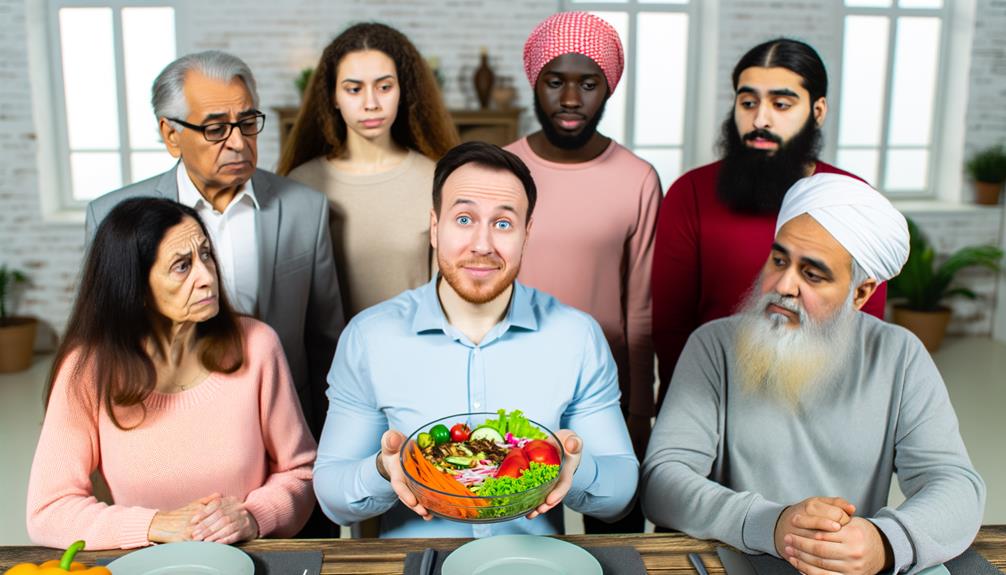Imagine you’re sitting at your family’s dinner table, the aroma of your mom’s famous gravy wafts through the air, but this time you’re not reaching for it. You’ve decided to make a significant change – you’re transitioning to a vegan lifestyle. Though this decision is deeply personal and driven by your commitment to health, environmental sustainability, or animal rights, it’s not without its share of challenges. One such challenge is navigating your family’s reactions, which might range from supportive to skeptical, or even dismissive. How do you deal with these varied reactions while staying true to your decision? You’ll need patience, understanding, and a good deal of nutritional knowledge. We’ll explore this process together, helping you to maintain those cherished family bonds while also honoring your vegan journey.
Key Takeaways
- Family members may initially react with confusion and resistance to your vegan transition, rooted in a lack of understanding.
- Handle negative responses calmly and respectfully, listening to concerns and communicating your commitment to the vegan lifestyle.
- Maintain confidence in your decision by reminding yourself of the positive impacts of veganism and surrounding yourself with a supportive vegan community.
- Family gatherings can be opportunities to introduce and explain your choices, showcasing delicious vegan dishes and discussing the reasons behind your new lifestyle. Over time, family members may come to understand and support your choices.
The Initial Family Reaction
While embracing a vegan lifestyle can be a liberating personal choice, it’s crucial to understand that your family may initially react with confusion and resistance, often stemming from potential misunderstandings and misconceptions about veganism. Your decision to go vegan could be perceived as a radical eating habit change, which might not sit well with non-vegan family members.
You may also face possible challenges and negative reactions, including feeling isolated or even experiencing bullying. It’s important to remember that these reactions are typically rooted in a lack of understanding rather than ill-will. As you navigate through your vegan transition, be patient and empathetic with your family members.
Moreover, some family members might interpret your veganism as a form of moral superiority or judgment. It’s essential to communicate that your dietary decisions don’t reflect a judgement on their own eating habits, but rather a personal choice you’ve made for yourself. Prepare yourself for some initial discomfort and resistance as you introduce your new lifestyle to your family.
Handling Negative Responses
Navigating the choppy waters of negative responses requires a calm, informed, and respectful approach, especially when dealing with non-vegan family members. It’s crucial to keep your cool amidst the storm of misunderstandings and misconceptions about your vegan transition. When handling negative responses, lend an ear to their concerns, but also firmly communicate your commitment to a vegan lifestyle.
As you respond to their queries or oppositions, do so informatively without being defensive. Use humor to lighten the atmosphere when faced with jokes about your lifestyle change. Remember, it’s your journey to become vegan, and they’re just trying to comprehend it.
If you encounter disrespectful comments, set boundaries. Ask for the same respect you give their dietary choices. Share your reasons for adopting a vegan lifestyle, emphasizing shared values like health, compassion, and ethical reasons. This can bridge the gap between you and your family and friends.
Maintaining Confidence in Your Decision
As you continue on your vegan journey, it’s essential to remain confident in your decision, constantly reminding yourself of the positive impacts your choice has on your health, the environment, and animal welfare. Since you’ve turned vegan, you’re likely facing a mix of reactions from your whole family. Remember, they need time to adjust to your new vegan lifestyle.
- To lead by example, you can:
- Share facts about the vegan diet and its benefits
- Show them the variety of plant-based meals you enjoy
- To maintain confidence in your decision, you can:
- Surround yourself with the vegan community, online or in local meetups
- Keep learning about vegan nutrition
Your confidence in your vegan journey can help reduce potential friction within the family. Your resolve might even inspire others in your family to make healthier, more compassionate lifestyle choices. As a new vegan, it’s crucial not to feel isolated or defensive but to share your journey with love and patience. In the end, maintaining confidence in your decision is about being true to your values while fostering understanding and respect within your family.
Veganism and Family Gatherings
Family gatherings can throw a curveball your way when you’re newly transitioning to a vegan lifestyle, but with patience, education, and open communication, these can become great opportunities to introduce and explain your choices. It’s okay if the idea of foregoing eating animal products like meat at these events feels intimidating. Remember, your vegan transition is a personal journey, and it’s important to approach how family members react with understanding and compassion.
At gatherings, you might face a spread of non-vegan food that you used to enjoy. But don’t let this deter you. Instead, seize the golden opportunity to introduce tasty vegan food to your loved ones. Bring a couple of your favourite vegan dishes to share; not only will this ensure you have something to eat, but it will also allow your family to experience just how delicious and satisfying vegan food can be.
Veganism and family gatherings can co-exist harmoniously with a bit of planning and open dialogue. Discuss your new lifestyle with your family, educate them on why you’ve stopped eating meat and other animal products. Over time, they’ll come to understand and even support your choices.
Ongoing Support and Understanding
While it’s true that your transition to veganism might be met with disbelief or dismissal from your family members at first, it’s crucial to remember that this is a journey of ongoing support, understanding, and education. Your new lifestyle might be the first time they’ve encountered veganism, so it’s nice to know that patience, compassion, and education can go a long way.
Here are some strategies to encourage ongoing support and understanding:
- Educating your family about veganism:
- Responding to concerns about protein intake
- Providing answers to common questions about veganism
- Setting boundaries and remaining respectful:
- Dealing with discomfort during family meals
- Handling non-vegan comments and questions calmly
Frequently Asked Questions
How Do People Feel After Going Vegan?
After going vegan, you’ll likely experience health improvements and body adaptations. You might feel proud of your ethical considerations and the environmental impact. Embrace the culinary exploration and meal planning, it’s part of the journey.
How Do I Transition My Family to Vegan?
Introduce vegan shopping tips and family menu planning to ease your family into a vegan lifestyle. Debunk vegan myths, and discuss vegan protein sources, kids’ meals, and cooking basics. Deal with resistance patiently.
What Is the Impact of One Person Going Vegan?
Ever considered the ripple effect of going vegan? You’re challenging dietary norms, confronting vegan stereotypes, and promoting animal welfare. It’s a bold step with environmental and health benefits, despite cultural implications and stigmatization.
What Are the Withdrawals From Going Vegan?
You’ll face protein deficiency, nutrient imbalance, meat cravings, dairy withdrawal, energy fluctuations, emotional challenges, social implications, and taste adjustments. Remember, it’s your journey. Stay compassionate and patient with yourself during this transition.







